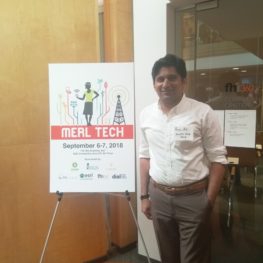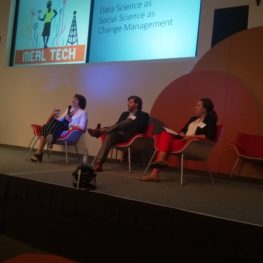In bustling and demanding life of Washington DC, international events; conferences, workshops, seminars etc. are always happening for international development practitioners. As part of the Frontier’s long-term strategy, the organization always valued their team me mbers, and allowed them to grow and yield the best results with participation in workshops, training and seminars. Reflecting on this, I attended one of the dynamic conferences on September 6-7, 2018, that was MERL Tech DC 2018. The theme of the conference was to assess role of Monitoring, Evaluation Research and Learning (MERL) and technology, and how M&E will be integrated with the contemporary emergent technologies like Big Data, remote sensing, Geographic Information System (GIS), use of satellites and drones in data collection.
mbers, and allowed them to grow and yield the best results with participation in workshops, training and seminars. Reflecting on this, I attended one of the dynamic conferences on September 6-7, 2018, that was MERL Tech DC 2018. The theme of the conference was to assess role of Monitoring, Evaluation Research and Learning (MERL) and technology, and how M&E will be integrated with the contemporary emergent technologies like Big Data, remote sensing, Geographic Information System (GIS), use of satellites and drones in data collection.
The conference sessions, panels and presentations revolve around what consequences the emerging technologies will have on our traditional practices of Monitoring & Evaluation (M&E), or if we expand more further it to MERL. Will this technology hulk going to replace M&E in organizations? Intellectual debates on the topics were at central stage where panelist engage audience about how technology is embedded in our routine data lives and how accurate measures we can take with help from it.

The role of traditional M&E discussed, and it was emphasized that if there’s an enough evidence, why still we see that major decisions in organizations are taken without taking them into account or giving them a worth they needed. There are rare examples in organizations and M&E community where the evaluation findings utilized and incorporated learning into the program loop. The experts also made it clear that the use of technology is not expensive as it always thought as. The use of technology would reduce a lot of manual stuff from organizational systems and processes.
The use of technology is inevitable in M&E considering new business norms of the development world. The organizations who are going to embrace the technological advancements are learning organizations and will witness efficiency in their course of business. An out of the box thinking required to embed technology for problem solving and prudent decision making backed by the evidence. The overall culture and atmosphere in organizations that help support new ideas, innovation and encourage the use of modern tools, adopt change openly and remove the causes which resist change, is necessary to grow and learn. The technology hulk should eat organizations problems and challenges than the prevalent fear of not using it because the past has been successful without it. Time to change, learn, adapt and grow!



